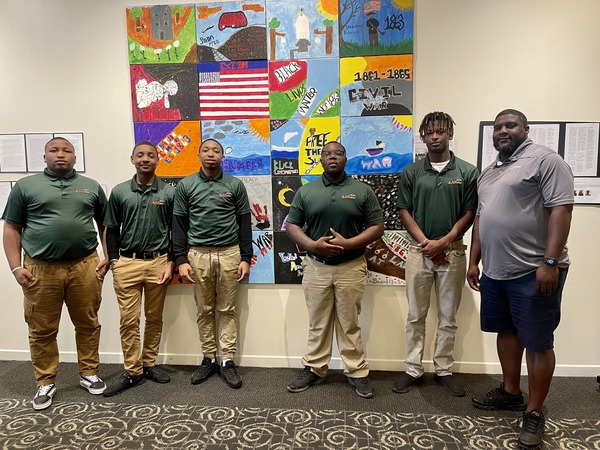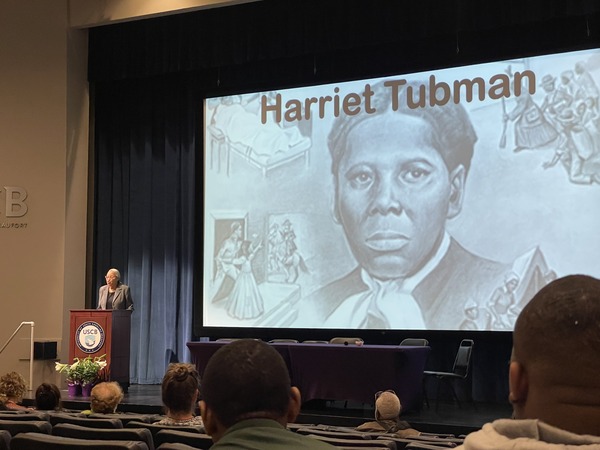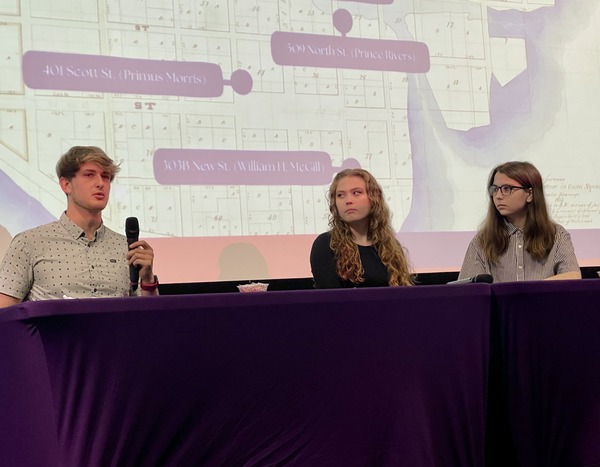USCB Hosts Symposium "Breathing Democracy into Spaces: 1st South Carolina Volunteers of African Descent"
New historical research, community advocacy and art commemorating the contributions of African-American soldiers in the Civil War came to life in “Breathing Democracy into Spaces: 1st South Carolina Volunteers of African Descent.” The symposium on April 8 at USCB’s Center for the Arts in Beaufort was the culmination of a year-long grant project centered at the Institute for the Study of the Reconstruction Era (ISRE).
 AMIKids Beaufort learned about the First South Carolina Volunteers of African Descent
and created interpretative artwork. Their artwork was displayed at the USCB Center
for the Arts art project.
AMIKids Beaufort learned about the First South Carolina Volunteers of African Descent
and created interpretative artwork. Their artwork was displayed at the USCB Center
for the Arts art project.“The First South Carolina Volunteers of African Descent initiative is crucial to a better understanding of the role of African Americans during the Civil War,” said Dr. Valinda W. Littlefield, Interim Director of the IRSE.
In this interdisciplinary project, faculty and graduate students worked closely with undergraduate, middle and high school students on archival research and collecting oral histories and other materials about the 1st South Carolina Volunteers. Documenting the history of African American soldiers serving in the US Armed Forces strengthened partner organizations and community efforts to preserve this history, while empowering students who presented their work in a variety of mediums.
The symposium focused on the importance of the first volunteers of African descent who served in the military in South Carolina during The Civil War and the role of Abolitionist and Union Major General David Hunter (1802-1886) and The Militia Act of 1862, which allowed men of color to serve under arms. Their contributions played a huge role in jump-starting the Reconstruction Era.
With funding from the Dick and Sharon Stewart Foundation and a McCausland grant from the University of South Carolina’s College of Arts & Sciences, Littlefield was able to hire USC and USCB students as research assistants. They explored pension records, land use and deeds, and other aspects of this era. Littlefield and the Coordinator of middle and high school students’ project and program Rhonda Carey mentored students from Beaufort and Hampton counties in history and art projects about the First South Carolina Volunteers.
 Valinda W. Littlefield, Interim Director, USCB Institute for the Study of the Reconstruction
Era, moderated the symposium.
Valinda W. Littlefield, Interim Director, USCB Institute for the Study of the Reconstruction
Era, moderated the symposium.Dr. James Shinn, Assistant Professor of History at USCB, led undergraduate students Grace Farish, Kolby Minckler, and Samantha Mischke on their research project: “Researching the 1st South: Pension Records, Land Deeds, and the GAR (Grand Army of the Republic),” which they presented at the symposium.
 Dr. Shinn’s students Kolby Minckler, Samantha Mischke, and Grace Farish presenting
their research project.
Dr. Shinn’s students Kolby Minckler, Samantha Mischke, and Grace Farish presenting
their research project.After a welcome by USCB Chancellor Al M. Panu, government officials, members of the National Park Service and local history buffs heard presentations, admired art work depicting the era and watched a video produced by Jeremy Smalls where the middle and high school students explained their projects.
Other symposium highlights included:
• "Prequel to Glory: 1st South Carolina Volunteers of African Descent" by Chris Allen and Rich Condon, Reconstruction Era National Historical Park
• ”Doing ‘Good Brave Work’: Harriett Tubman's Service in Beaufort” by Rev. Kenneth Hodges - Senior Pastor, Tabernacle Baptist Church
• "Researching the 1st South: Maps, Education, Muster Rolls and Colors" by Melissa DeVelvis, Jennifer Marler, Elizabeth Laney, and Chelsea Johnson
• Reconstruction Era National Historical Park Overview by Christopher Barr and Nathan Betcher, Reconstruction Era National Historical Park
• "The Original Panther: Prince Rivers and the Lost City of Hamburg" by Stephen Berry, Gregory Professor of the Civil War Era, University of Georgia
• "Researching the 1st South: Aligning History with South Carolina Social Studies Standards" by Colin Welsh, Logan Rogers, Claire Ouzts, Emory Farrand, Bailey Pope
• "Red Pantaloons: The 1st South Carolina and the Zouave Black Atlantic" by Tom Brown, Professor of History, USC
• "Researching the 1st South: Diaries, Letters, Medical Records, and Photos” by Benjamin Goff, Eboni Belton, Chelsea Johnson, Zachary Poole, USC